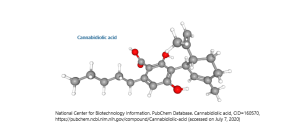 CBDA is one of the cannabinoid acids produced in the trichomes of the cannabis plant. CBDA can easily be decarboxylated to CBD if exposed to heat. Due to its low stability, synthetic analogs of CBDA have been developed to address this challenge.
CBDA is one of the cannabinoid acids produced in the trichomes of the cannabis plant. CBDA can easily be decarboxylated to CBD if exposed to heat. Due to its low stability, synthetic analogs of CBDA have been developed to address this challenge.
CBDA inhibits anandamide cellular uptake. CBDA does not display significant activity as either an agonist or an inverse agonist at the CB1 receptors.
CBDA has been shown to inhibit nausea-induced behavior in rats by enhancing the activation of 5-HT1A receptors. CBDA demonstrates 100-fold greater affinity for the 5-HT1A receptors.
Anxiolytic effects of CBDA may require the presence of a specific stressor. Rock et al. reported no anxiolytic effects in rats without a prior explicit stressor; however, administration of CBDA (0.1-100 μg/kg) or CBD (5 mg/kg) prevented the FS-induced anxiogenic-like responding.
CBDA shares the capability of CBD to activate the transient receptor potential (TRP) cation channels, TRPV1 and TRPA1, and to antagonize TRPM8; however, it produces these effects with significantly less potency than CBD.
CBDA shows promise as a potential treatment for anticipatory nausea and vomiting, and anxiety.
References:
- De Petrocellis L, Ligresti A, Moriello AS, et al. Effects of cannabinoids and cannabinoid-enriched Cannabis extracts on TRP channels and endocannabinoid metabolic enzymes. Br J Pharmacol. 2011;163(7):1479-1494. doi:10.1111/j.1476-5381.2010.01166.x.
- Bolognini D, Rock EM, Cluny NL, et al. Cannabidiolic acid prevents vomiting in Suncus murinus and nausea-induced behaviour in rats by enhancing 5-HT1A receptor activation. Br J Pharmacol. 2013;168(6):1456-1470. doi:10.1111/bph.12043.
- Bagdy G, Kecskemeti V, Riba P, Jakus RJ Neurochem. 2007 Feb; 100(4):857-73.
- Rock EM, Limebeer CL, Petrie GN, Williams LA, Mechoulam R, Parker LA. Effect of prior foot shock stress and Δ9-tetrahydrocannabinol, cannabidiolic acid, and cannabidiol on anxiety-like responding in the light-dark emergence test in rats. Psychopharmacology (Berl). 2017;234(14):2207-2217. doi:10.1007/s00213-017-4626-5 .















